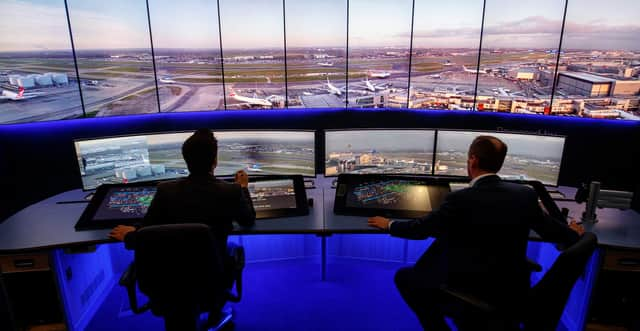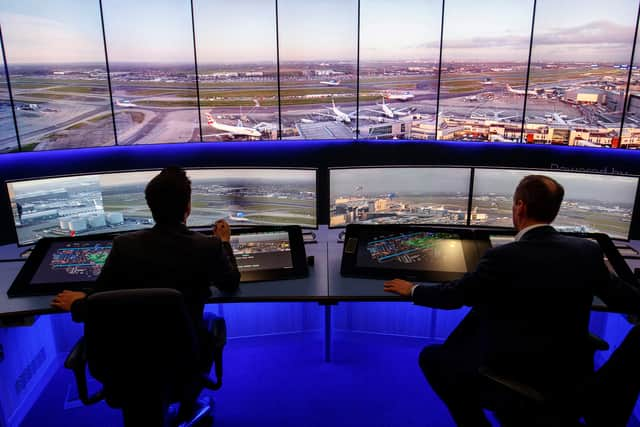Airport disruption 2023: Air traffic controller's job explained, why flights were cancelled - what can be done to prevent chaos next year?


Europe has been hit by air traffic control problems over the summer which has caused huge disruption, grounded flights and left holidaymakers stranded. Air traffic control issues in the UK over the August bank holiday caused hundreds of flights to be either cancelled or delayed with the incident occurring due to an anomaly that forced the system to stop processing flight plans.
Last week strikes by air traffic controllers in France led to more flights being cancelled with some 10,000 passengers having their plans wrecked. On Sunday 19 November short staffing at the air traffic control tower at Heathrow Airport caused flights to also be delayed and cancelled. Meanwhile in September an air traffic controller at London’s Gatwick airport went off sick causing thousands of passengers to face cancelled, delayed or diverted flights.
Advertisement
Hide AdAdvertisement
Hide AdHere we explain what air traffic controllers actually do, what it takes to become one and why so many are striking. We will also delve into why air traffic control has been linked to travel disruption this summer, what are the reasons behind it and what can be done to prevent this disruption happening again next year.


What are air traffic controllers?
Air traffic control helps aircraft to move safely and efficiently through the sky. Controllers are in constant contact with pilots, giving them information and advice to make sure they take off and land safely and on time. They give the pilots permission to take off, approve the route they’ll take, and ensure that aircraft are kept a safe distance apart in the skies, tracking their progress as they go.
In the UK, aircraft in the airways system are handled by NATS (National Air Traffic Services) and overseen by the Civil Aviation Authority (CAA). Eurocontrol oversees air traffic management across the European Union.
Various Air Navigation Service Providers (ANSPs), the employers of controllers, provide individual air traffic control at airports, which is specialised to each location. Controllers hand over to one another as an aircraft travels between different jurisdictions.
What does it take to become an air traffic controller?
Advertisement
Hide AdAdvertisement
Hide AdIt takes at least two and a half years to train an air traffic control officer (ATCO). Every controller goes through basic training, followed by specialised training in a specific expertise, such as Tower Control, Approach Surveillance or Area Control Surveillance. They must then progress to field training at the airfield they will eventually control.
Finally, they will complete on-the-job training with an ATCO who is qualified to provide it. At airports where traffic has seasonal peaks, simulators are used for training during less busy periods to help maintain competence.
As every airport varies in density and complexity, and part of the training is location specific, air traffic controllers cannot be easily transferred between different airports. Strict regulations govern the whole process and mean that most parts of the training can only be led by qualified ATCs. This means there is limited capacity for training, and staff shortages squeeze this even further.
Why are air traffic control workers striking?
The cost of living crisis has led workers in various sectors to strike over pay and many ATC strikes have been due to a demand for wages that are in line with inflation. Unions have also called for improved working conditions and support for providing a safe and efficient service for transport users - especially in light of continuous staff shortages.
Advertisement
Hide AdAdvertisement
Hide AdMost recently, French ATCs have walked out over new legislation requiring them to register their intent to strike at least 48 hours in advance. French strikes are particularly disruptive as they also affect ‘overflights’ using French airspace.
Why has there been air traffic control disruption this summer?
Staff shortages drove much of this year’s airport disruption and strike action. In September, Gatwick Airport was forced to limit flights after its already depleted ATC team was struck with Covid-19. At the time, easyJet chief executive Johan Lundgren blamed understaffing for the disruption, telling a British newspaper that the way the service is structured, run and regulated is in need of modernisation.
Passengers at London’s Heathrow Airport faced delays and cancellations due to ATC staff shortages and strong winds, and on the same day in France, ATC staff staged a walkout.
The pandemic has also been partly to blame for the disruption as health restrictions, low air traffic and uncertainty put training for many air traffic controllers on hold. Being able to manage lots of overlapping planes is a key part of the job - and that takes practice. The demand for air traffic control really took off in the 1980s but now many of the industry's experts are now coming to the end of their careers.
What can be done to prevent air traffic control disruption?
Advertisement
Hide AdAdvertisement
Hide AdModernisation of the way air traffic control is structured, run and regulated is one factor that could help prevent disruption. In France, improvements are already in the pipeline. The country has scheduled a major overhaul of its air traffic control system in 2024, with thousands of flights to be cut while it is installed. A spokesperson for Nats told NationalWorld that the biggest issue which has caused the disruptions was the “the closure of Ukraine airspace” which “constrained airspace elsewhere, moving traffic to already busy airspace sectors”. The spokesperson added that there were also “significant weather events, which disrupted travel, for example the summer heatwave in Europe and resulting wildfires in Rhodes, Corfu etc, which meant that airlines had to schedule repatriation flights, and cancel scheduled flights to some destinations, which changes the normal flight schedule. These and other events have resulted in volatility, making air traffic ‘peaky’ and often presenting in places and at times that isn’t usual.” Factors like these have caused disruption this year. The spokesperson confirmed that the UK has been responsible for less than three per cent of Europe’s delays this year to date, despite handling nearly a quarter of Europe’s traffic.
Comment Guidelines
National World encourages reader discussion on our stories. User feedback, insights and back-and-forth exchanges add a rich layer of context to reporting. Please review our Community Guidelines before commenting.
